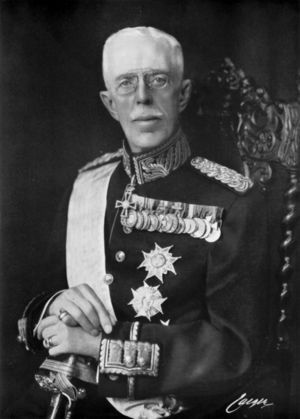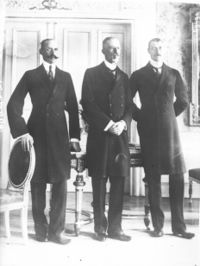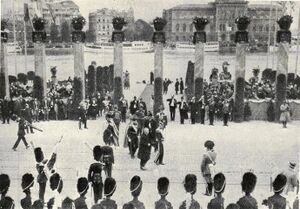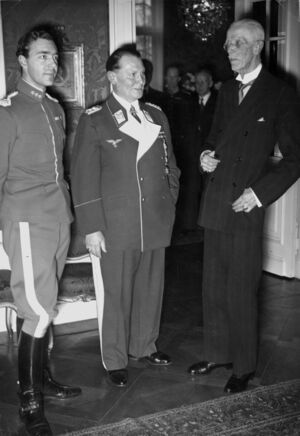گوستاف الخامس من السويد
| گوستاف الخامس Gustaf V | |||||
|---|---|---|---|---|---|
 | |||||
| ملك السويد | |||||
| العهد | 8 ديسمبر 1907 – 29 أكتوبر 1950 | ||||
| سبقه | اوسكار الثاني | ||||
| تبعه | گوستاف السادس أدولف | ||||
| وُلِد | 16 يونيو 1858 قصر دورتنينگهولم | ||||
| توفي | 29 أكتوبر 1950 قصر دورتنينگهولم | ||||
| الدفن | |||||
| الزوج | ڤكتوريا من بادن | ||||
| الأنجال | گوستاف السادس أدولف من السويد، الأمير ڤيلهلم، دوق سودرمانلاند، الأمير إريك، دوق فاستمانلاند | ||||
| |||||
| البيت | آل برنادوت | ||||
| الأب | اوسكار الثاني من السويد | ||||
| الأم | صوفيا من ناساو | ||||
| الديانة | لوثري | ||||
گوستاف الخامس Oscar Gustaf Adolf(و. 16 يونيو 1858 - ت. 29 أكتوبر 1950)، هو ملك السويد من 1907 حتى 1950، وهو الابن البكر لاوسكار الثاني، تم في عهده التحول إلى الملكية الدستورية، مؤسسة حاكمة في دولة ديمقراطية. ويُسجَّل له حفاظه على الحياد التام للسويد في أثناء الحربين العالميتين.
الحياة العامة

When he ascended the throne, Gustaf V was, at least on paper, a near-autocrat. The 1809 Instrument of Government made the king both head of state and head of government, and ministers were solely responsible to him. However, his father had been forced to accept a government chosen by the majority in Parliament in 1905. Since then, prime ministers had been de facto required to have the confidence of the Riksdag to stay in office.
Early in his reign, in 1910, Gustaf V refused to grant clemency to the convicted murderer Johan Alfred Ander, who thus became the last person to be executed in Sweden.
At first, Gustaf V seemed to be willing to accept parliamentary rule. After the Liberals won a massive landslide in 1911, Gustaf appointed Liberal leader Karl Staaff as Prime Minister. However, during the runup to World War I, the elites objected to Staaff's defence policy. In February 1914, a large crowd of farmers gathered at the royal palace and demanded that the country's defences be strengthened. In his reply, the so-called Courtyard Speech—which was actually written by explorer Sven Hedin, an ardent conservative—Gustaf promised to strengthen the country's defences. Staaff was outraged, telling the king that parliamentary rule called for the Crown to stay out of partisan politics. He was also angered that he had not been consulted in advance of the speech. However, Gustaf retorted that he still had the right to "communicate freely with the Swedish people." The Staaff government resigned in protest, and Gustaf appointed a government of civil servants headed by Hjalmar Hammarskjöld (father of future UN Secretary-General Dag Hammarskjöld) in its place.

The 1917 elections showed a heavy gain for the Liberals and Social Democrats, who between them held a decisive majority. Despite this, Gustaf initially tried to appoint a Conservative government headed by Johan Widén. However, Widén was unable to attract enough support for a coalition. It was now apparent that Gustaf could no longer appoint a government entirely of his own choosing, nor could he keep a government in office against the will of Parliament. With no choice but to appoint a Liberal as prime minister, he appointed a Liberal-Social Democratic coalition government headed by Staaff's successor as Liberal leader, Nils Edén. The Edén government promptly arrogated most of the king's political powers to itself and enacted numerous reforms, most notably the institution of complete (male and female) universal suffrage in 1918–1919. While Gustaf still formally appointed the ministers, they now had to have the confidence of Parliament. He was now also bound to act on the ministers' advice. Although the provision in the Instrument of Government stating that "the King alone shall govern the realm" remained unchanged, the king was now bound by convention to exercise his powers through the ministers. Thus, for all intents and purposes, the ministers did the actual governing. While ministers were already legally responsible to the Riksdag under the Instrument of government, it was now understood that they were politically responsible to the Riksdag as well. Gustaf accepted his reduced role, and reigned for the rest of his life as a model limited constitutional monarch. Parliamentarianism had become a de facto reality in Sweden, even if it would not be formalized until 1974, when a new Instrument of Government stripped the monarchy of even nominal political power.
Gustaf V was considered to have German sympathies during World War I. His political stance during the war was highly influenced by his wife, who felt a strong connection to her German homeland. On 18 December 1914, he sponsored a meeting in Malmö with the other two kings of Scandinavia to demonstrate unity. Another of Gustaf V's objectives was to dispel suspicions that he wanted to bring Sweden into the war on Germany's side.[1]
Although effectively stripped of political power, Gustaf was not completely without influence. In 1938, for instance, he personally summoned the German ambassador to Sweden and told him that if Hitler attacked Czechoslovakia over its refusal to give up the Sudetenland, it would trigger a world war that Germany would almost certainly lose.[2] Additionally, his long reign gave him great moral authority as a symbol of the nation's unity.
تعاطف مزعوم مع النازيين
Both the King and his grandson Prince Gustav Adolf socialized with Nazi leaders before World War II, though arguably for diplomatic purposes. Gustaf V attempted to convince Hitler during a visit to Berlin to soften his persecution of the Jews, according to historian Jörgen Weibull. He was also noted for appealing to the leader of Hungary to save its Jews "in the name of humanity."
When Nazi Germany invaded the Soviet Union in June 1941, Gustaf V tried to write a private letter to Hitler thanking him for taking care of the "Bolshevik pest" and congratulating him on his "already achieved victories".[3] He was stopped from doing so by Prime Minister Per Albin Hansson.[4]
During the war, Gustav invited Swedish Nazi leader Sven Olov Lindholm to Stockholm Palace. The Swedish king had friends in Lindholm's movement.[5][6][7]
أزمة منتصف صيف 1941
According to Prime Minister Hansson, during the Midsummer crisis, the King in a private conversation had threatened to abdicate if the government did not approve a German request to transfer a fighting infantry division, the so-called Engelbrecht Division, through Swedish territory from southern Norway to northern Finland in June 1941, around Midsummer. The accuracy of the claim is debated, and the King's intention, if he really made that threat, is sometimes alleged to be his desire to avoid conflict with Germany. The event has received considerable attention from Swedish historians and is known as midsommarkrisen, the Midsummer Crisis.[8]
Confirmation of the King's action is contained in German Foreign Policy documents captured at the end of the war. On 25 June 1941, the German Minister in Stockholm sent a "Most Urgent-Top Secret" message to Berlin in which he stated that the King had just informed him that the transit of German troops would be allowed. He added:
The King's words conveyed the joyful emotion he felt. He had lived through anxious days and had gone far in giving his personal support to the matter. He added confidentially that he had found it necessary to go so far as to mention his abdication.[9]
الأنجال
| الاسم | وُلد | توفى | الهوامش |
|---|---|---|---|
| الملك گوستاف السادس أدولف من السويد | 11 نوفمبر 1882 | 15 سبتمبر 1973 | تزوج 1) Princess Margaret of Connaught (1882–1920)، أنجبا (4 أبناء وابنة واحدة)، تزوج 2) Lady Louise Mountbatten (1889–1965)، أنجبت (ابنة غير شرعية) |
| Prince Vilhelm of Sweden, Duke of Södermanland | 17 June 1884 | 5 June 1965 | married Grand Duchess Maria Pavlovna of Russia (1890–1958), had issue |
| Prince Erik of Sweden, Duke of Västmanland | 20 أبريل 1889 | 20 سبتمبر 1918 | لم يتزوج وتوفى بعد إصابته Spanish Flu، لم ينجب |
السلف
انظر أيضاً
- الألعاب الاولمپية الصيفية 1912، التي افتتحها
الهامش
- ^ "Kin Gustav V's No Nazi Sympathizer". Real Clear History. 7 December 2020. Retrieved 26 April 2021.
- ^ William Shirer, The Rise and Fall of the Third Reich (Touchstone Edition) (New York: Simon & Schuster, 1990)
- ^ Dagens Nyheter 070729 "Churchill fick vredesutbrott över svenske kungens svek". Debatt (in السويدية). 29 July 2007. Archived from the original on 30 September 2007. Retrieved 29 July 2007.
- ^ "King Gustav V of Sweden: Nazi Sympathiser?". RoyaltyRobert Blogger and Writer. 15 June 2020. Retrieved 26 April 2021.
- ^ "Karaktärsmord på döda svenskar". Svenska Dagbladet (in السويدية). 18 September 2002. Retrieved 26 April 2021.
- ^ Gustaf V och andra Världskriget. Carlsson, Erik. 2007. ISBN 9789185057887
- ^ Operation Norrsken: Om Stasi och Sverige under kalla kriget, av Christoph Andersson
- ^ Hansson (Wahlbäck, Regeringen och kriget. Ur statsrådens dagböcker 1939–41)
- ^ Documents of German Foreign Policy 1918–1945 Series D Volume XIII The War Years 23 June 1941 – 11 December 1941, Published in UK by HMSO and in US By Government Printing Office.
وصلات خارجية
گوستاف الخامس وُلِد: 16 يونيو 1858 توفي: 29 أكتوبر 1950
| ||
| ألقاب ملكية | ||
|---|---|---|
| سبقه اوسكار الثاني |
ملك السويد 1907–1950 |
تبعه گوستاف السادس أدولف |
| ألقاب ملكية | ||
| شاغر | ولي عهد السويد 1872–1907 |
تبعه گوستاف أدولف |
| ولي عهد النرويج 1872–1905 |
تبعه اولاڤ الخامس | |
| شاغر | دوق ڤرملاند 1858–1907 |
شاغر |
| مناصب سياسية | ||
| شاغر | نائب ملك السويد 1884 |
شاغر |
| جوائز وانجازات | ||
| سبقه Sir Cyril Newall |
غلاف مجلة تايم 30 أكتوبر 1939 |
تبعه توم هارمون |
- CS1 السويدية-language sources (sv)
- Short description is different from Wikidata
- Pages using authority control with unknown parameters
- أشخاص من بلدية إكرو
- Dukes of Swedish Provinces
- آل برنادوت
- Knights of the Order of Saint John (Bailiwick of Brandenburg)
- فرسان الوبر الذهبي
- Knights of the Order of the Norwegian Lion
- ملوك پروتستانت
- حائزو مرتبة النسر الأسود
- حائزو السلسلة الڤيكتورية الملكية
- لوثريون سوديون
- ملوك السويد
- لاعبو تنس سويديون
- International Tennis Hall of Fame inductees
- خريجو جامعة أوپسالا
- زعماء سياسيون في الحرب العالمية الثانية
- حائزو مرتبة النسر الأبيض (پولندا)
- سويديون من أصل فرنسي
- ملوك سويديون من أصل ألماني
- أولياء عهد السويد
- مواليد 1858
- وفيات 1950
- مدفونون في كنيسة ريدارهولمن
- Extra Knights Companion of the Garter
- Honorary Knights Grand Cross of the Royal Victorian Order
- Grand Crosses of the Order of the Tower and Sword
- Grand Commanders of the Order of the Dannebrog
- Recipients of the Silver Wolf Award
- Recipients of the Collar of the Order of the White Star
- Knights of the Order of the Most Holy Annunciation
- Recipients of the Cross of Liberty (Estonia)
